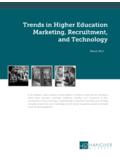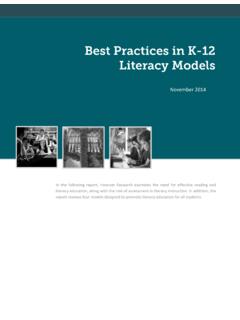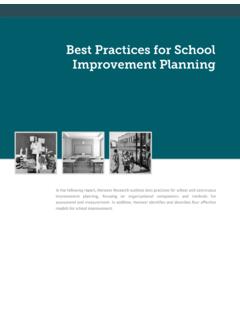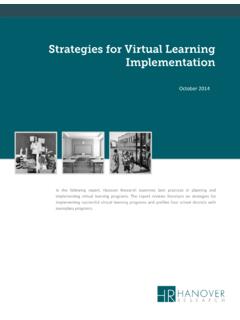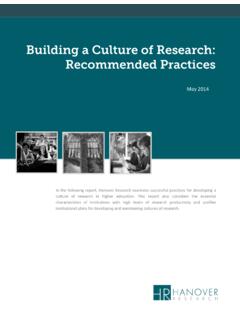Transcription of The Impact of Formative Assessment and Learning …
1 In the following report, Hanover Research provides an overview of the research related to Formative Assessment and Learning intentions Impact on student achievement. The brief begins with an analysis of current research linking Formative Assessment to academic performance and then moves into a discussion of Learning objectives Impact on student outcomes. The Impact of Formative Assessment and Learning Intentions on Student Achievement August 2014 Hanover Research | August 2014 2014 Hanover Research | District Administration Practice2 TABLE OF CONTENTS Executive Summary and Key Findings .. 3 KEY FINDINGS .. 3 Formative Assessment and Student Achievement .. 4 Limitations of the Research .. 6 The Impact of Formative Assessment on Academic Achievement .. 7 Learning Intentions and Academic Achievement .. 12 Hanover Research | August 2014 2014 Hanover Research | District Administration Practice3 EXECUTIVE SUMMARY AND KEY FINDINGS The beneficial outcomes of Formative Assessment , otherwise known as Assessment for Learning , have been touted by researchers and educators alike.
2 The evidentiary basis of much of this confidence can be traced back to several seminal works, which synthesize and interpret existing research on the topic. Learning intentions, as an important component of Formative Assessment , have also been the subject of substantial research. This brief will provide an overview of the main discourses in literature linking Formative Assessment and Learning objectives to student achievement. KEY FINDINGS Existing research yields promising conclusions regarding the Impact of Formative Assessment on student academic achievement. Though the focus of most research is not on summative test scores, findings indicate that students who receive Formative Assessment perform better on a variety of achievement indicators than their peers do. While many of these studies exhibit methodological limitations, experts agree that the practice of Assessment for Learning shows promise in its ability to improve student performance.
3 The literature supports the efficacy of explicitly stated Learning intentions and Assessment criteria in improving student Learning outcomes. Learning objectives are the subject of a significant body of research, though most research has been conducted at the higher education level. Findings indicate that Learning intentions, specifically as a part of guided instruction methods, positively Impact student Learning . Similarly, studies demonstrate that statement of Learning objectives and Assessment criteria improve students self Assessment abilities and, as a result, improve Learning outcomes. Hanover Research | August 2014 2014 Hanover Research | District Administration Practice4 Formative Assessment AND STUDENT ACHIEVEMENT Educators have long taken the beneficial Impact of Formative Assessment for granted. Numerous sources tout the ability of these strategies to improve student academic achievement.
4 However, the definition of Formative Assessment remains amorphous and comprises a significantly variable set of practices. Black and Wiliam, authors of the seminal investigation into the efficacy of Formative assessments, put forth the following as a working definition: We use the general term Assessment to refer to all those activities undertaken by teachers and by their students in assessing themselves that provide information to be used as feedback to modify teaching and Learning activities. Such Assessment becomes Formative Assessment when the evidence is actually used to adapt the teaching to meet student Their guidelines emphasize the applications of Formative assessments, thereby defining these assessments by their use. Specifically, to adapt instruction to particular learners needs based on Assessment results. Other, broader definitions exist as well. For instance, Dunn and Mulvenon distinguish between Formative assessments, or assessments designed to monitor student progress during the Learning process ( , Assessment for Learning ) and Formative evaluations.
5 The latter is defined as: ..the evaluation of Assessment based evidence for the purposes of providing feedback to and informing teachers, students, and educational stakeholders about the teaching and Learning process. Formative evaluation also informs policy, which then affects future evaluation practices, teachers, and Despite the lack of consensus on definitions or even the specific techniques that comprise Formative assessments, many sources point to the pathway of knowledge acquisition as a distinguishing feature. Essentially, Formative Assessment seeks to present students with explicit goals or outcomes of instruction, to help them assess their current position in relation to these goals, and to equip them with the tools to bridge the gap between the two. Thus, effective Formative Assessment must help students answer the following questions:3 Where Am I Trying to Go? Students need clearly articulated, concise Learning targets to be able to answer this first question.
6 Learning is easier when learners understand what goal they are trying to achieve, the purpose of achieving the goal, 1 Black, P. and D. Wiliam. Inside the Black Box: Raising Standards Through Classroom Assessment . Phi Delta Kappa, October 1998. p. 2. http://faa 2 Dunn, K. and S. Mulvenon. A Critical Review of Research on Formative Assessment : The Limited Scientific Evidence of the Impact of Formative Assessment in Education. Practical Assessment , Research & Evaluation, 14:7, March 2009. p. 3. 3 Bullet points quoted from: Chappuis, S. and R. Stiggins. Classroom Assessment for Learning . Educational Leadership, 60:1, September 2002. p. 3 4. Hanover Research | August 2014 2014 Hanover Research | District Administration Practice5 and the specific attributes of success. Teachers should continually help students clarify the intended Learning as the lessons unfold not just at the beginning of a unit of study.
7 Where Am I Now? All of these strategies help students ascertain and, even more important, learn how to ascertain where they are and where they need to be, an awareness that is central to their ultimate success. How Do I Close the Gap? Assessment for Learning helps students know what to do to move from their current position to the final Learning goal. To meet Learning goals, students must participate fully in creating the goals, analyzing Assessment data, and developing a plan of action to achieve the next goal. These three core processes form the theoretical underpinning of Formative Assessment . Further conceptions note that teachers, students, and peers all play a role in the Learning process and, as a result, each have roles to play in Formative Assessment . Figure below depicts the five main strategies associated with Assessment for Learning and defines them as they relate to the various players in Assessment .
8 Teachers roles emphasize setting clear goals, making aspects of success explicit, providing useful feedback, and encouraging peer and self reflection. Peer and learner requirements center on understanding Learning objectives and continuously assessing progress against these. Figure : Aspects of Formative Assessment ACTOR WHERE THE LEARNER IS GOING WHERE THE LEARNER IS RIGHT NOW HOW TO GET THERE Teacher 1 Clarifying Learning intentions and criteria for success 2 Engineering effective classroom discussions and other Learning tasks that elicit evidence of student understanding 3 Providing feedback that moves learners forward Peer Understanding and sharing Learning intentions and criteria for success 4 Activating students as instructional resources for one another Learner Understanding Learning intentions and criteria for success 5 Activating students as the owners of their Learning Source: Black and Wiliam4 4 Black, P.
9 And D. Wiliam. Developing the Theory of Formative Assessment . Educational Assessment , Evaluation and Accountability, 21:1, February 2009. p. 8. Hanover Research | August 2014 2014 Hanover Research | District Administration Practice6 LIMITATIONS OF THE RESEARCH There are several aspects of Formative Assessment that make it difficult to reliably quantify the Impact of interventions on student performance. The first stems from the lack of a universal definition of the term or what practices fall within its purview. This absence of consistent terms makes research difficult because different studies employ a variety of conceptions. According to Dunn and Mulvenon, the vagueness of the constitutive and operational definitions directly contributes to the weaknesses found in the related research and dearth of empirical evidence identifying best practices related to Formative Assessment . 5 However, several experts argue that this vague conception is at the very heart of Formative Assessment s efficacy.
10 It is meant to be used in a variety of contexts and classrooms and therefore must not be confined by rigid parameters. The flexible and responsive nature of Assessment for Learning practice is therefore manifest in attempts to define it. Clark concludes that the key notions of modification and adaptation to meet the needs of specific learners or groups of learners, is a key feature and one that undermines consistent application and standardization. 6 Due to these considerations, quantitative analysis of Formative Assessment interventions is difficult to carry out and validate. Fidelity of implementation, variations in techniques used, and the presence of intervening variables, such as unique teacher characteristics, are just a few of the reasons why existing research should be interpreted with an amount of caution. However, according to Clark, the essential point remains that quantitative ambiguities are not sufficient to obscure or undermine the deep cognitive and meta cognitive processes germinated by high quality interaction and effective feedback; a point widely understood and accepted.

